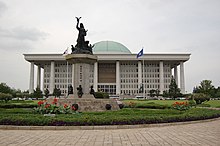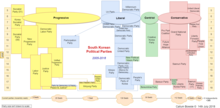Benutzer:ManuBu/Politisches System Südkoreas
Vorlage:Short description Vorlage:About Vorlage:More citations needed Vorlage:Infobox political system

Vorlage:Politics of South Korea
The politics of the Republic of Korea takes in place in the framework of a presidential representative democratic republic, whereby the President is the head of state, and of a multi-party system. The government exercises Executive power and Legislative power is vested in both the government and the National Assembly. The Judiciary is independent of the executive and the legislature and comprises a Supreme Court, appellate courts and a Constitutional Court. Since 1948, the constitution has undergone five major revisions, each signifying a new republic. The current Sixth Republic began with the last major constitutional revision in 1987.
The Economist Intelligence Unit rated South Korea with a score of 8/10, making it the 23rd most democratic country in 2019[1]
National government
[Bearbeiten | Quelltext bearbeiten]Executive branch
[Bearbeiten | Quelltext bearbeiten]Vorlage:Office-table |President |Moon Jae-in |Democratic Party of Korea |10 May 2017 |- |Prime Minister |Chung Sye-kyun |Democratic Party of Korea |14 January 2020 |}
The head of state is the president, who is elected by direct popular vote for a single five-year[2] term. The president is Commander-in-Chief of the Republic of Korea Armed Forces and enjoys considerable executive powers.
The president appoints the prime minister with approval of the National Assembly, as well as appointing and presiding over the State Council of chief ministers as the head of government. On 12 March 2004, the executive power of then president Roh Moo-hyun was suspended when the Assembly voted to impeach him and Prime Minister Goh Kun became an Acting President. On 14 May 2004, the Constitutional Court overturned the impeachment decision made by the Assembly and Roh was reinstated.
On 10 March 2017, Park Geun-hye became the only president to be removed by the Constitutional Court after impeachment by the National Assembly. Prime Minister Hwang Kyo-ahn temporarily served as an acting president between the suspension of Park from 8 December 2016 until the next presidential election, which was held in May 2017. On 9 july 2017, Moon Jae-in became the 19th president of South Korea, replacing acting president Hwang Kyo-ahn.
Legislative branch
[Bearbeiten | Quelltext bearbeiten]
The National Assembly (국회, 國會, gukhoe) has 300 members, elected for a four-year term, 253 members in single-seat constituencies and 47 members by proportional representation. The ruling Democratic Party of Korea is the largest party in the Assembly.
Judicial branch
[Bearbeiten | Quelltext bearbeiten]The South Korean judiciary is independent of the other two branches. The random judiciary body is the Supreme Court, whose justices are appointed by the president with the consent of the National Assembly. In addition, the Constitutional Court oversees questions of constitutionality. South Korea has not accepted compulsory ICJ jurisdiction.
Political parties and elections
[Bearbeiten | Quelltext bearbeiten]Vorlage:Elect South Korea elects on national level a head of state – the president – and a legislature. The president is elected for a five-year term by the people. The National Assembly (Gukhoe) has 300 members, elected for a four-year term, 253 members in single-seat constituencies and 47 members by proportional representation.
The main two political parties in South Korea are the liberal Democratic Party of Korea (lit. "Together Democratic Party", DPK) and the conservative People Power Party (PPP), formerly the United Future Party (UFP). The liberal camp and the conservative camp are the dominant forces of South Korean politics at present.
Vorlage:Parties in the South Korean Assembly
Political nature
[Bearbeiten | Quelltext bearbeiten]South Korea's political history has always been prone to splits from and merges with other parties. One reason is that there is greater emphasis around the 'politics of the person' and rather than party, therefore party loyalty is not strong when disagreements occur. The graph below illustrates the extent of the political volatility within the last 10 years alone. These splits were intensified after the 2016 South Korean political scandal.

Latest elections
[Bearbeiten | Quelltext bearbeiten]Vorlage:South Korean legislative election, 2020 Vorlage:South Korean presidential election, 2017
Political pressure groups and leaders
[Bearbeiten | Quelltext bearbeiten]- Federation of Korean Industries
- Federation of Korean Trade Unions
- Korean Confederation of Trade Unions
- Korean National Council of Churches
- Korean Traders Association
- Korean Veterans' Association
- National Council of Labor Unions
- National Democratic Alliance of Korea
- National Federation of Farmers' Associations
- National Federation of Student Associations
Administrative divisions
[Bearbeiten | Quelltext bearbeiten]One Special City (Teukbyeolsi, Capital City), six Metropolitan Cities (Gwangyeoksi, singular and plural), nine Provinces (Do, singular and plural) and one Special Autonomous City (Sejong City).
- Seoul Teukbyeolsi (서울특별시)
- Busan Gwangyeoksi (부산광역시)
- Daegu Gwangyeoksi (대구광역시)
- Incheon Gwangyeoksi (인천광역시)
- Daejeon Gwangyeoksi (대전광역시)
- Gwangju Gwangyeoksi (광주광역시)
- Ulsan Gwangyeoksi (울산광역시)
- Gyeonggi-do (경기도)
- Gangwon-do (강원도)
- Chungcheongbuk-do (충청북도)
- Chungcheongnam-do (충청남도)
- Jeollabuk-do (전라북도)
- Jeollanam-do (전라남도)
- Gyeongsangbuk-do (경상북도)
- Gyeongsangnam-do (경상남도)
- Jeju Teukbyeoljachi-do (제주특별자치도)
- Sejong Teukbyeol-jachisi (세종특별자치시)
International organization participation
[Bearbeiten | Quelltext bearbeiten]AfDB, APEC, AsDB, BIS, CP, EBRD, ESCAP, FAO, G-77, IAEA, IBRD, ICAO, ICCt, ICC, ICRM, IDA, IEA (observer), IFAD, IFC, IFRCS, IHO, ILO, IMF, IMO, Inmarsat, Intelsat, Interpol, IOC, IOM, ISO, ITU, ITUC, MINURSO, NAM (guest), NSG, OAS (observer), OECD, OPCW, OSCE (partner), UN, UNCTAD, UNESCO, UNIDO, UNMOGIP, UNOMIG, UNU, UPU, WCO, WHO, WIPO, WMO, WToO, WTrO, Zangger Committee
References
[Bearbeiten | Quelltext bearbeiten]External links
[Bearbeiten | Quelltext bearbeiten]- South Korea at The World Factbook
- Cheong Wa Dae (Seite dauerhaft nicht mehr abrufbar, festgestellt im April 2018.)
- National Assembly
- ↑ Korea, South. In: Democracy Index 2019. Economist Intelligence Unit, abgerufen am 28. Januar 2020.
- ↑ Korea, South. In: The World Factbook. Central Intelligence Agency, abgerufen am 30. Mai 2017.